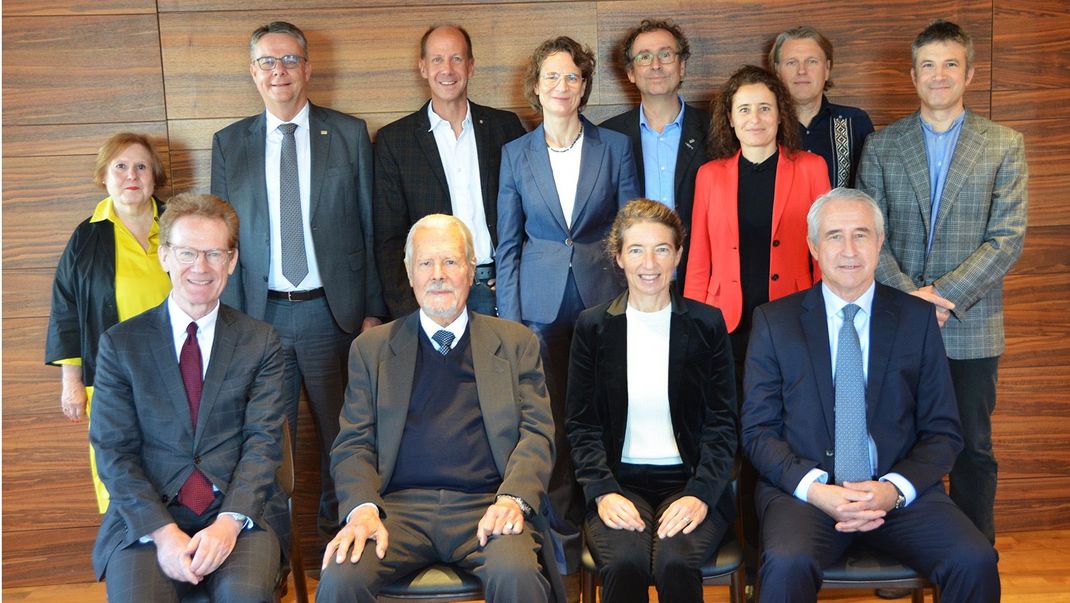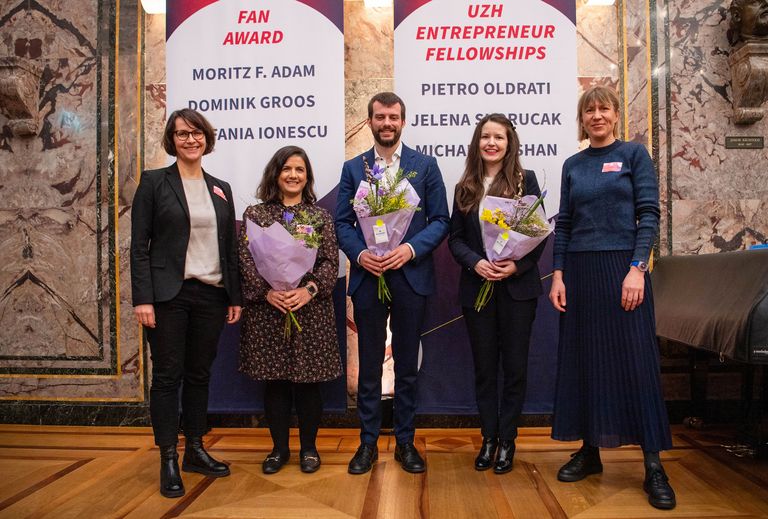Thanks to a generous donation from the Irene M. Staehelin Foundation, the University of Zurich can expand its research on discrimination and violence against women. The funds will allow two professorships and a research center to be established.
Irène M. Staehelin-Schindler was an anthropologist who campaigned for disadvantaged people and minorities. She bequeathed part of her estate to the Irene M. Staehelin Foundation, which was set up in 2020 to continue her life’s work in promoting humanitarian causes, human rights and in particular women’s rights, development aid, as well as nature and species conservation. In her will, Staehelin also provided funding for a professorial chair at the University of Zurich to explore issues of violence against women and their systematic discrimination.
Last week, UZH President Michael Schaepman and Vice President Christian Schwarzenegger met with representatives of the Staehelin Foundation and the UZH Foundation to sign the agreement. “We are delighted by the generous donation and would like to thank the foundation for the trust bestowed in us,” said Michael Schaepman. The agreement sets out the appointment of two professors in the fields of evolutionary anthropology and science of religion. Connected with this is the establishment of a Center on Evolutionary Anthropology and the Study of Religion and Women in Society. President Schaepman emphasized that this would not in any way impede the university’s academic freedom. The appointments and the center will be implemented by UZH in accordance with its guidelines.
Interdisciplinary focus
The first endowed chair will focus on subjects around evolutionary cultural development and gender roles and will be located within the Faculty of Science. The second professorship, based at the Faculty of Theology and the Study of Religion, will address the role of religions in the context of discrimination and violence against women.
The cooperation between anthropology and science of religion is also at the heart of the planned center. This will be interdisciplinary in nature, aiming to foster international exchange, namely with universities in Southern African nations and other countries of the Global South. “We feel confident that these two professorships and the center are ideally aligned with the wishes of the benefactor Irène M. Staehelin-Schindler,” says Christian Schwarzenegger, Vice President Faculty Affairs and Scientific Information.
Fascinating opportunities
The donation from the foundation will finance the professorships, three doctoral candidate positions and the center over a 25-year period. Stephan Neuhauss, Vice Dean of Research at the Faculty of Science, sees it as a “fascinating” opportunity. The prospective professorship in his department will focus on comparative and evolutionary anthropology. The study of our nearest relatives, the primates, plays an important role in understanding human cultural development. Inequalities and violence between genders already exist in ape societies and a better biological comprehension is essential with regard to understanding the dynamics in human societies. The planned professorship opens up a range of research fields that will be explored in cooperation with the second professorship at the Faculty of Theology and the Study of Religion.
According to Dorothea Lüddeckens, professor of sociological science of religion, the second new professorship will examine gender relations in religious traditions and communities. The issues addressed will include questions around the extent to which religions influence the discrimination of women and violence against them. “Religions can legitimize or even provoke discrimination, but there is also religious potential for combating them,” says Lüddeckens, adding that violence against women also exists without religion. This for instance also raises the question whether religious concepts and norms are simply a reflection of societal, patriarchal structures, and what conditions allow emancipatory impulses to arise in religions.
Lüddeckens and Neuhauss point out that the precise research activities will be fleshed out with the incoming professors. The positions will be advertised in the coming weeks.
Excellent reputation
Christoph Schmid, president of the Irene M. Staehelin Foundation, is very pleased with the agreement: “The interdisciplinary approach across two faculties is entirely in accordance with the wishes of the deceased.” As an academically trained anthropologist, Irène M. Staehelin-Schindler attached great value to scientific research. She was an intellectual person and liked to get to the bottom of things. Schmid went on to say that the combination of anthropology and science of religion corresponded to her interests and joined-up way of thinking, and that it promised to answer questions that had preoccupied her. In fact, the endowed chairs at UZH are part of a wider involvement by the foundation, enabled by Irène M. Staehelin. Her consideration of the University of Zurich in her will is due to personal contacts and the excellent reputation of UZH research.
The UZH Foundation is responsible for administering the agreement between the Irene M. Staehelin Foundation, the University of Zurich and the UZH Foundation. Its role is to ensure that the funds are made available for use by UZH at the set time and agreed amount, in accordance with the purpose of the donation. “A legacy of this kind allows a benefactor to realize their heartfelt wish and have a long-term impact on research,” says Annelise Alig Anderhalden, CEO of the UZH Foundation, adding that the generous donation from Irène M. Staehelin-Schindler was a perfect example of this.
To the UZH-News



![[Translate to English:] Portraitaufnahme von Jonas Birk.](/fileadmin/_processed_/c/7/csm_Jonas_Birk_Interview_7efc87a5cb.jpg)